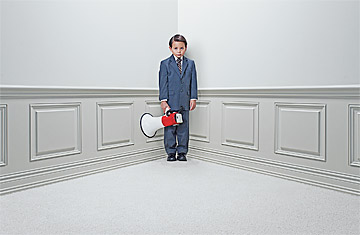
The Power of Shyness
(3 of 7)
Kagan predicted that the infants who had the most noticeable responses--the group he called high-reactive--would likely be introverted as adolescents, whereas low-reactives would likely be extroverted. When he brought his subjects back into the lab as they grew older, his hypothesis proved true: high-reactive infants matured into more inhibited, introverted teenagers. "There's a strong footprint on temperament that you see early in life," says Dr. Carl Schwartz, a psychiatrist at Massachusetts General Hospital in Boston and a former student of Kagan's. "It's not deterministic, but if you're a highly reactive baby, you're less likely to become a bond trader or Bill Clinton."
Psychologist Elaine Aron, author of the 1997 book The Highly Sensitive Person, explains what's behind this. People who are introverts by nature, she says, may simply have a lower threshold for stimulation than others. It doesn't take too many popped balloons and crowded rooms before they learn to compensate by keeping a low, quiet profile, conserving their limited energy. The definition of hell for an introvert isn't other people--not exactly. But people are stimuli, and a cocktail party or brainstorming session full of them can blow their neural circuits. So they limit their exposure. Meanwhile, extroverts are a little bit like addicts who are always in search of a high, seeking out stimuli--in the healthier form of social situations--that would make an introvert's head ring.
In studies conducted with functional magnetic resonance imagers, Schwartz found that the amygdalae in the brains of those original high-reactive subjects--now adults--tend to light up when they're shown pictures of unfamiliar faces, while the amygdalae of low-reactive subjects show less activity. That makes sense: the amygdala processes fearful stimuli, among other functions, and the introvert's first reaction to new people or experiences is usually guarded caution. "It's not genes or the environment alone that drive this," says Schwartz. "It's the environment in dialogue with the genes."
Quiet Babies, Fretful Parents
Caution, inhibition and even fearfulness may be healthy--and smart--adaptations for the overstimulated person, but they're still not characteristics many parents would want in their children, especially in a society that lionizes the bold. So it's common for moms and dads of introverted offspring to press their kids to be more outgoing, lest they end up overlooked in class and later in life. That, however, can be a mistake--and not just because our temperaments are difficult to change fundamentally.
The very fact that introverts are more sensitive to their environment often means they're fully aware that they appear out of step with the expectations of others, and they can easily internalize that criticism. Just about every adult introvert can remember being scolded, even if gently, for being too quiet as a kid. Anytime a teacher grades on classroom participation, introverted kids will be at a disadvantage. There's nothing wrong with parents' nudging their shy children into the world, but there is something wrong if it's more than a nudge. "You don't want to break the kid by overwhelming their coping capacity," says Jay Belsky, a psychologist at the University of California at Davis. "The key is sensitive encouragement."
